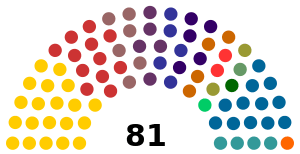Federal Senate
| Federal Senate Senado Federal | |
|---|---|
| 55th Legislature of the National Congress | |
 | |
| Type | |
| Type | |
Term limits | Unlimited 8-year terms |
| Leadership | |
President of the Federal Senate | |
Majority Leader | |
Minority Leader |
Mário Couto, PSDB |
| Structure | |
| Seats | 81 |
 | |
Political groups | |
| Elections | |
Last election | October 5, 2014 |
| Meeting place | |
 | |
|
National Congress Building Brasília, Federal District, Brazil | |
| Website | |
| http://www.senado.gov.br | |
 |
| This article is part of a series on the politics and government of Brazil |
|
|
|
Administrative divisions
|
| Foreign relations |
|
Politics portal |
The Federal Senate (Portuguese: Senado Federal) is the upper house of the National Congress of Brazil. Created by the first Constitution of the Brazilian Empire in 1824, it was initially similar to the United Kingdom's House of Lords.[1] Since the Proclamation of the Republic in 1889 the Federal Senate has resembled the United States Senate.
Currently, the Senate comprises 81 seats. Three Senators from each of the 26 states and three Senators from the Federal District are elected on a majority basis to serve eight-year terms. Elections are staggered so that two-thirds of the upper house is up for election at one time and the remaining one-third four years later. When one seat is up for election in each State, each voter casts one vote for the Senate; when two seats are up for election, each voter casts two votes, and the voter cannot give his two votes for the same candidate, but, in elections for the renewal of two-thirds of the Senate, each party can present two candidates for election. The candidate in each State and the Federal District (or the first two candidates, when two thirds of the seats are up for election) who achieve the greatest plurality of votes are elected.
The current president of the Brazilian Senate is Renan Calheiros, from the Brazilian Democratic Movement Party of Alagoas. He was elected in early 2013 for a two-year term.
History
The Federal Senate of Brazil was established as the Senate of the Empire by the Constitution of 1824, first enacted after the Declaration of Independence.
Following independence, in 1822, Emperor Pedro I ordered the convocation of a National Assembly to draft the country's first Constitution. Following several disagreements with the elected deputies (which included representatives from present-day Uruguay, then part of the Brazilian Empire under the name of Província Cisplatina), the Emperor dissolved the Assembly. In 1824 Pedro I implemented the first Constitution which established a Legislative branch with the Chamber of Deputies as the lower house, and the Senate as an upper house.
The first configuration of the Senate was a consulting body to the Emperor. Membership was for life and it was a place of great prestige, to which only a small part of the population could aspire.
Members of the Senate were elected, but they had to be at least 40 years old and have an annual income of 800,000 contos-de-réis, which limited candidates to wealthy citizens. Voters also faced an income qualification. Voting in an election for the Senate was limited to male citizens with an annual income of at least 200,000 contos-de-réis. Those who qualified for this did not vote directly for Senators; instead, they voted for candidates to be Senate electors. To be a Senate elector required an annual income of 400,000 contos-de-réis. Once elected, these electors would then vote for senator. The election itself would not result in a winner automatically. The three candidates receiving the most votes would make up what was called a "triple list", from which the Emperor would select one individual that would be considered "elected". The Emperor usually chose the candidate with the most votes, but it was within his discretion to select whichever of the three individuals listed. The unelected Princes of the Brazilian Imperial House were senators by right and would assume their seats in the Senate upon reaching age 25.
The original Senate had 50 members, representing all of the Empire's Provinces, each with a number of senators proportional to its population.
Following the adoption of the 1824 Constitution the first session of the Senate took place in May 1826. The Emperor had repeatedly delayed calling the first election, which had led to accusations that he would attempt to establish an absolutist government.
Current Senators
| Federative Unit | Senator | Party | Birth city | Term | Notes | |
|---|---|---|---|---|---|---|
| Acre | Aníbal Diniz | |
|
2010–2015 | Substitute of Tião Viana, elected State Governor of Acre. | |
| Jorge Viana | |
|
2011–2019 | |||
| Sérgio Petecão | |
|
2011–2019 | |||
| Alagoas | Fernando Collor | |
|
2007–2015 | ||
| Benedito de Lira | |
|
2011–2019 | |||
| Renan Calheiros | |
|
2011–2019 | President of the Senate | ||
| Amapá | Gilvam Borges | |
|
2011–2019 | Re-elected. | |
| José Sarney | |
|
2007–2015 | |||
| Randolfe Rodrigues | |
|
2011–2019 | |||
| Amazonas | Eduardo Braga | |
|
2011–2019 | ||
| João Pedro | |
|
2007–2015 | Substitute of Alfredo Nascimento, appointed as Minister of Transportation. | ||
| Vanessa Grazziotin | |
|
2011–2019 | |||
| Bahia | Walter Pinheiro | |
|
2011–2019 | ||
| Lídice da Mata | |
|
2011–2019 | |||
| João Durval | |
|
2007–2015 | |||
| Ceará | Inácio Arruda | |
|
2007–2015 | ||
| José Pimentel | |
|
2011–2019 | |||
| Eunício Oliveira | |
|
2011–2019 | |||
| Distrito Federal | Rodrigo Rollemberg | |
|
2011–2019 | ||
| Cristovam Buarque | |
|
2011–2019 | Re-elected. | ||
| Gim Argello | |
|
2007–2015 | Substitute of Joaquim Roriz. | ||
| Espírito Santo | Magno Malta | |
|
2011–2010 | Re-elected. | |
| Ricardo Ferraço | |
|
2011–2019 | |||
| Ana Rita Esgario | |
|
2011–2015 | Substitute of Renato Casagrande, elected State Governor of Espírito Santo. | ||
| Goiás | Wilder Pedro de Morais | |
|
2011–2019 | Replaced Demóstenes Torres, removed from office for breach of parliamentary ethics. | |
| Lúcia Vânia | |
|
2011–2019 | Re-elected. | ||
| Cyro Miranda Júnior | |
|
2010–2015 | Substitute of Marconi Perillo, elected State Governor of Goiás. | ||
| Maranhão | Epitácio Cafeteira | |
|
2007–2015 | ||
| João Alberto Souza | |
|
2011–2019 | |||
| Lobão Filho | |
|
2011–2019 | Substitute of Edison Lobão, appointed Minister of Mines and Energy. | ||
| Mato Grosso | Jayme Campos | |
|
2007–2015 | ||
| Blairo Maggi | |
|
2011–2019 | |||
| Pedro Taques | |
|
2011–2019 | |||
| Mato Grosso do Sul | Delcídio Amaral | |
|
2011–2019 | Re-elected. | |
| Marisa Serrano | |
|
2007–2015 | |||
| Waldemir Moka | |
|
2011–2019 | |||
| Minas Gerais | Aécio Neves | |
|
2011–2019 | Leader of the Opposition in the Senate. | |
| Clésio Andrade | |
|
2011–2014 | Substitute of Eliseu Resende, deceased. | ||
| Zezé Perrella | |
|
2011–2019 | Substitute of Itamar Franco, deceased. | ||
| Pará | Flexa Ribeiro | |
|
2011–2019 | Re-elected. | |
| Marinor Brito | |
|
2011–2019 | |||
| Mário Couto | |
|
2007–2015 | |||
| Paraíba | Cícero Lucena | |
|
2007–2015 | ||
| Vital do Rego Filho | |
|
2011–2019 | |||
| Wilson Santiago | |
|
2011–2019 | |||
| Paraná | Álvaro Dias | |
|
2015-2023 | ||
| Sérgio de Souza | |
|
2011–2019 | Substitute of Gleisi Hoffmann, appointed as Chief of Staff | ||
| Roberto Requião | |
|
2011–2019 | |||
| Pernambuco | Jarbas Vasconcelos | |
|
2007–2015 | ||
| Humberto Costa | |
|
2011–2019 | |||
| Armando Monteiro | |
|
2011–2019 | |||
| Piauí | Ciro Nogueira | |
|
2011–2019 | ||
| João Vicente Claudino | |
|
2007–2015 | |||
| Wellington Dias | |
|
2011–2019 | |||
| Rio de Janeiro | Francisco Dornelles | |
|
2007–2015 | ||
| Marcelo Crivella | |
|
2011–2019 | Re-elected. | ||
| Lindbergh Farias | |
|
2011–2019 | |||
| Rio Grande do Norte | Paulo Davim | |
|
2011–2019 | Substitute of Garibaldi Alves Filho, appointed as Minister of Social Security | |
| José Agripino | |
|
2011–2019 | Re-elected. | ||
| Garibaldi Alves | |
|
2011–2015 | Substitute of Rosalba Ciarlini, elected State Governor of Rio Grande do Norte. | ||
| Rio Grande do Sul | Paulo Paim | |
|
2011–2019 | Re-elected. | |
| Pedro Simon | |
|
2007–2015 | Re-elected. | ||
| Ana Amélia Lemos | |
|
2011–2019 | |||
| Rondônia | Acir Gurgacz | |
|
2007–2015 | Took office after Expedito Júnior had his term revoked. | |
| Ivo Cassol | |
|
2011–2019 | |||
| Valdir Raupp | |
|
2011–2019 | Re-elected. | ||
| Roraima | Angela Portela | |
|
2011–2019 | ||
| Mozarildo Cavalcanti | |
|
2007–2015 | |||
| Romero Jucá | |
|
2011–2019 | Re-elected. Leader of the Government in the Senate. | ||
| Santa Catarina | Luiz Henrique da Silveira | |
|
2011–2019 | ||
| Paulo Bauer | |
|
2011–2019 | |||
| Casildo Maldaner | |
|
2011–2015 | Substitute of Raimundo Colombo, elected State Governor of Santa Catarina. | ||
| São Paulo | Aloysio Nunes | |
|
2011–2019 | ||
| Eduardo Suplicy | |
|
2007–2015 | |||
| Marta Suplicy | |
|
2011–2019 | |||
| Sergipe | Eduardo Amorim | |
|
2011–2019 | ||
| Antônio Carlos Valadares | |
|
2011–2019 | Re-elected. | ||
| Maria do Carmo Alves | |
|
2007–2015 | |||
| Tocantins | João Ribeiro | |
|
2011–2019 | Re-elected. | |
| Kátia Abreu | |
|
2007–2015 | |||
| Vicentinho Alves | |
|
2011–2019 | |||
See also
- Federal institutions of Brazil
References
- ↑ "Senado Federal completa hoje 185 anos". R7 (in Portuguese). 6 May 2011. Retrieved 22 May 2012.
O Senado Federal foi criado com a primeira Constituição do Império, outorgada em 1824, inspirado, primeiramente, na Câmara dos Lordes da Grã-Bretanha. Sua primeira reunião ocorreu em 6 de maio de 1826.
.
External links
- Official website of the Brazilian Senate
- (Portuguese) Photos 360° of the Brazilian Senate
- List of all Brazilian senators (1826–2011; in Portuguese)
| |||||||||||||||||||
| ||||||||||
| ||||||||||||||
| ||||||||||||||||||||||